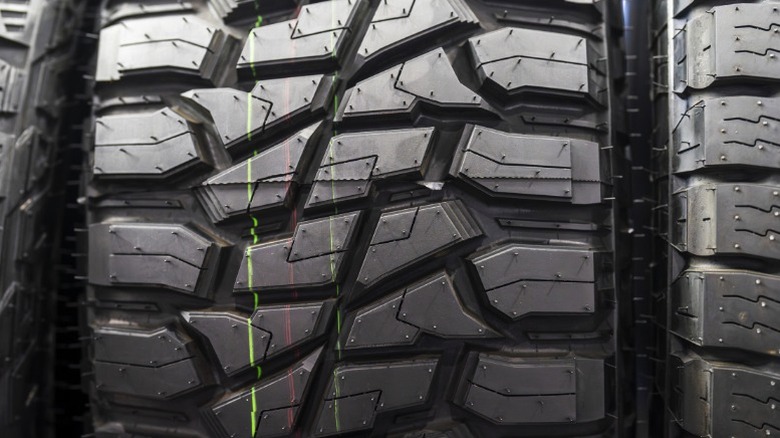Do All-Terrain Tires Affect MPG? What To Know Before You Buy
There are a lot of mission-critical parts that go into allowing your car to carry you down the road. Most drivers understand the role that the engine plays in generating vehicle power, but the engine is really only one part of a much larger system that includes everything from your transmission to your brakes and your suspension to your steering system and tires. Each component has its role, and each can have negative and positive influences on your driving experience, depending on their condition and how well you maintain them.
Tires, in particular, play an extremely vital role in allowing your car's wheels to grip the road and maintain traction while also helping to support the vehicle's weight. When it comes to helping your wheels grip the road, the tires' tread handles the bulk of responsibility. Tread refers to grooves and ridges cut into the rubber, allowing the tires to create and maintain traction against the pavement. However, not all tire tread is created equal, and different types of tires are designed for diverse driving scenarios. Some of the most common types include all-terrain, winter, and all-season tires. Each of these tire styles comes with different tread patterns, and each of those patterns can have an effect on your vehicle's performance.
All-terrain or off-road tires, in particular, can affect your car's gas mileage, thanks to the aggressive tread these products provide. On average, drivers who use aggressive off-road tires can expect to see a roughly 3% reduction in fuel mileage compared to drivers who use tires with less-aggressive tread. Why does that happen? That's exactly what we're going to discuss together.
How tire tread can affect your car's MPG
As mentioned, aggressive tread, like that found on all-terrain tires, can reduce your car's MPG by about 3%. That happens for a few reasons, and while the tread plays a large role, it's not the only factor contributing to a reduction in fuel mileage. Off-road tires tend to be larger than their all-season/all-weather counterparts. That larger diameter and heavier weight means that it requires more force to roll the tires along the road, resulting in increased stress on the engine and reduced MPGs. Additionally, aggressive tread typically means that a smaller portion of the tire will be in contact with the road at all times.
Since all-terrain tires are designed for uneven ground and various types of terrain, they're not ideal for smooth pavement. The less contact the tires have with the road, the more energy will be required to spin the wheels, which also contributes to reduced fuel mileage. Finally, many off-road driving enthusiasts run their all-terrain tires with lower air pressure than is standard. This helps the tires maintain traction on uneven ground and while driving over obstacles like rocks and tree limbs. However, while driving on pavement, that reduced air pressure can lead to drops in gas mileage.
If you use off-road tires and want to minimize the loss in MPGs, you should endeavor to inflate your tires properly when driving on pavement. Also, avoid aggressive and irresponsible driving habits, like taking off too fast from a stop sign and slamming on the brakes. You may also want to consider investing in a lighter set of all-terrain tires, or purchase a separate set of tires for street driving.

